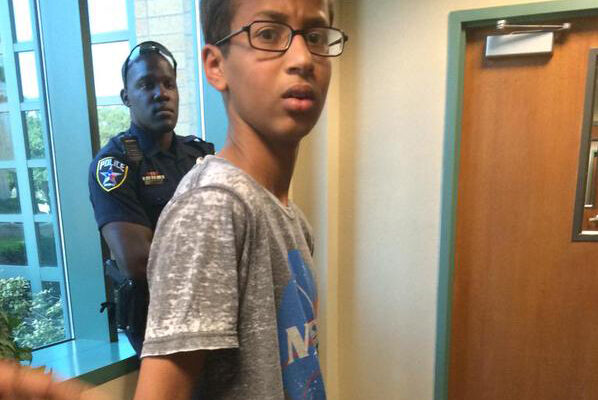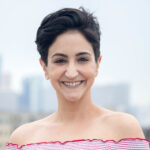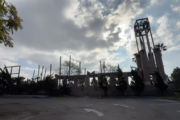A few weeks before I graduated as an undergrad from USC, a false complaint was lodged against me with the dean of my school. A fellow student claimed that I was plotting a terrorist act in Los Angeles.
The reason?
I had discussed potential high-risk targets in Los Angeles with peers in a study group. The study group was for a class titled, “Terrorism and Counterterrorism.”
According to my accuser, I had said that places like the Staples Center and Coliseum could be considered high value targets for terrorists looking for sites that may be under protected. He took this to mean that I was planning something or had some knowledge of an attack.
The reality: I was just a dedicated student participating in a study group.
My accuser saw the color of my skin, the foreignness of my name and my keen interest in the subject matter to be a threat to his security. This was three years after 9/11, and the threat this complaint carried was palpable. In my case, the complaint stopped with the dean, who knew me and knew that this complaint was not situated in fact, but fear. Nonetheless, when I walked across the stage at graduation and received the degree I had worked so hard for, the dean patted my back and whispered in my ear, “Everything is okay, don’t worry,” not “Congratulations.”
Last week, a 14-year-old boy in Irving, Texas was walked out of his classroom, detained by school authorities and handcuffed by police. He was taken to juvenile detention and questioned without the presence of his parents.
The reason?
He brought a homemade clock to school. This young boy is a member of the robotics club. He is bright, talented, interested in invention and engineering. Yet this young boy had his dreams dashed because his name is Ahmed Mohamed.
As the Internet was quick to point out, the response to his invention would not have been the same had this boy been of a different race or religion. Ahmed would have been applauded, encouraged and awarded.
The sad reality is that what happened to Ahmed in Irving, Texas is neither new nor exceptional. It is the daily reality of American Muslims. Each one of us has our own story or stories. Each one of us has been afraid, accused, suspected.
Accusations such as these vilify the innocent, criminalize achievement and serve to alienate American Muslims from civil society. Moreover, they work against real measures to counter violent extremism that come from within the community.
Go ahead. Ask a Muslim friend if they have ever had their own clock experience?
Others have been vilified and attacked simply for speaking Arabic in public or asking for a unopened can of soda on a plane. Ahmed was accused of assembling a bomb when he brought a home-made science project to class. I was accused of terrorism for participating actively in a study group.
In the same state of Texas—in Spring, a suburb of Houston—another Muslim family is enduring a related ordeal. Their son, radicalized through a variety of means, left the United States to join ISIS. His family, dedicated to the peaceful ideals of Islam, worked diligently to bring their son back to the U.S. He never made it to Syria, only Turkey, before his family’s emotional appeals brought him home. Today, their son faces up to 30 years in prison for providing material support to the Islamic State. This family succeeded in countering violent extremism through community-led approaches, and yet, they are punished rather than applauded.
American Muslims are working through a variety of means to counter violent extremism in our communities. We’re implementing the Muslim Public Affairs Council’s Safe Spaces Program. We are participating actively in our communities. American Muslim women, as the New York Times points out, have made particularly important strides in American social and political life. We are teaching our children to love science, creativity and invention. We are ordinary American people, some times even heroes. We are law-abiding and we self-police with dignity and grace. And yet, American Muslims continue to face persecution in our places of worship, in our homes, and in our schools.
There have been about 100 anti-Muslim hate crimes each year from 2011 to 2013, according to FBI data, accounting for about 14 percent of hate crimes due to religious bias.
Statements by President Obama and Mark Zuckerberg in response to Ahmed’s arrest are beautiful moves in the right direction. Ahmed no longer faces charges of bringing a “hoax bomb” to school, but continued to face a three-day suspension from his school. No apology has been issued by the school district, high school or Irving police department, even as it becomes increasingly clear that those in authority in Irving are at the heart of this entire ordeal. The mayor of Irving issued a statement in support of the actions of all involved. Mayor Beth Van Duyne has made Islamophobic statements in the past and has accepted awards from known Islamophobe Frank Gaffney and the Center for Security Policy.
The actions by those in authority, such as those in Irving and Spring, only work to alienate Muslim Americans and render our community-based efforts to counter violent extremism useless. Obama and Zuckerberg’s statements help Muslim American youth feel a sense of belonging to their communities, but we can do more.
A couple years after I was falsely accused of plotting domestic terrorism, I received an email from my accuser. He was racked with guilt over the position he had placed me in. Most surprisingly, he apologized.
This accusation was neither the first nor the last time I had been targeted due to my religion, but it was the only time I received closure. That closure did not erase the weeks of rumor mill I endured as my classmates speculated about who I was in whispers, nor did it not erase the feeling of alienation I carried with me long after, but it was a catalyst for a more hopeful outlook.
I hope Ahmed gains the closure he deserves and a community where he is welcome. His father said he won’t return to MacArthur High School.
Today, being targeted and accused of wrongdoing because of our religion and race is something that happens to all of us as American Muslims. Like Ahmed, I would like to imagine a world where it never happens at all.
(Photo via Twitter)
Hebah Farrag was the assistant director of research of the USC Center for Religion and Civic Culture through 2023.






